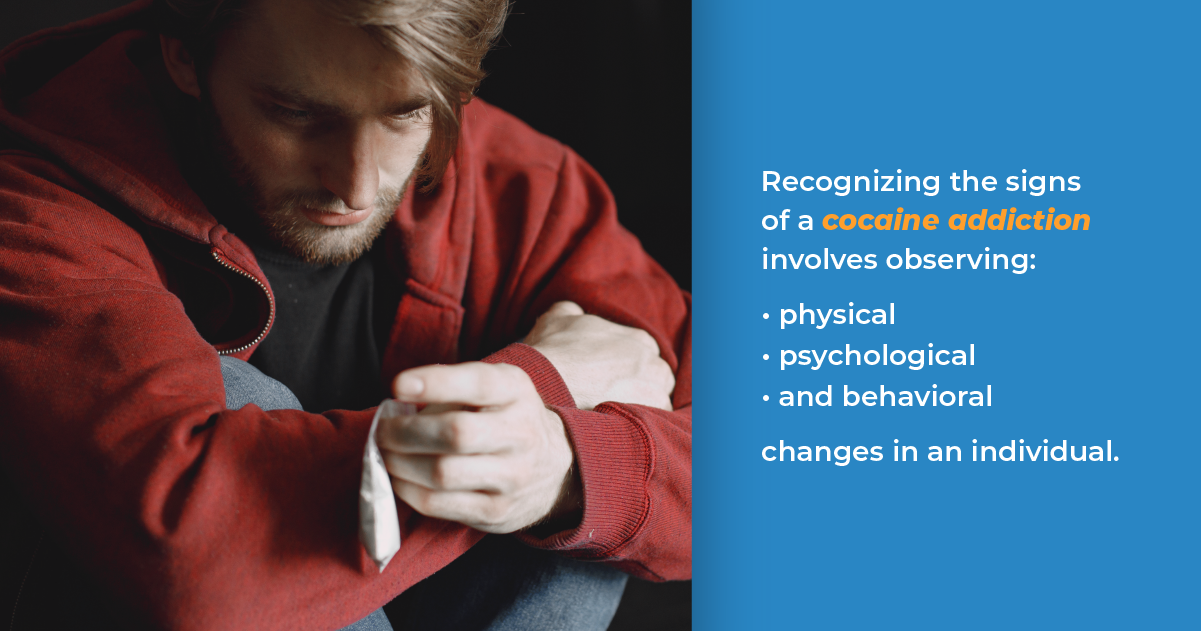Signs Of Cocaine Addiction: A Comprehensive Guide
Cocaine addiction is a medical disease where a person becomes dependent on the use of cocaine, a powerful stimulant drug. This addiction develops as repeated use alters the function of the brain, leading to cravings and a compulsive need for more cocaine to feel its effects.
Recognizing cocaine addiction involves observing the changes in body, mind, behavior, and relationships brought about by cocaine use. Keep reading as we delve into these signs, shedding light on the diverse ways cocaine use disorder can manifest and impact a person’s life.
Key Takeaways
Cocaine addiction leads to physical, psychological, and behavioral changes, impacting all aspects of life. Here is what you need to know:
- Changes in physicality and mood could indicate a substance use disorder.
- Increased secrecy, neglect of responsibilities, and engaging in risky behaviors are observable in people with cocaine addiction.
- Cocaine addictions impact all aspects of life.
Contact The Recovery Team at (800) 817-1247 to explore tailored programs for lasting recovery from substance abuse problems.
Physical Signs of Cocaine Addiction
When someone becomes addicted to cocaine, their body and appearance often reflect the toll of this powerful drug. Physical symptoms can include:
Changes in Appearance
Cocaine addiction might lead to rapid weight loss, dilated pupils, and frequent nosebleeds. Skin complexion may appear pale or gray due to reduced blood flow.
Changes in Sleep Patterns
Individuals addicted to cocaine might experience erratic sleep patterns, such as insomnia or excessive sleeping. This fluctuation can contribute to physical exhaustion and tiredness.
Health Effects
The health impacts of cocaine addiction can be severe, including cardiovascular issues like increased heart rate, high blood pressure, and a higher risk of heart attacks or strokes.
Tolerance and Withdrawal Symptoms
Over time, the body builds a tolerance to cocaine, requiring higher doses for the same effect. When a person stops using, cocaine withdrawal symptoms like depression, fatigue, and intense cravings can arise.
Track Marks
While not as common as with some other drugs, prolonged cocaine use via injection can lead to visible track marks or scars at injection sites.
Psychological Signs of Cocaine Addiction
Cocaine addiction doesn’t just impact the body; it significantly influences an individual’s mental and emotional well-being. The psychological signs may include:
Mood Swings
One of the prominent psychological signs is frequent and drastic mood swings. Cocaine can induce intense feelings of euphoria followed by abrupt crashes, causing individuals to swing between extreme highs and lows, impacting their emotional stability.
Anxiety and Paranoia
Persistent anxiety and paranoia are common psychological signs of cocaine addiction. Individuals may experience heightened feelings of nervousness, fear, and suspicion, even in non-threatening situations, contributing to chronic stress.
Depression
Chronic cocaine use can lead to depressive episodes. Individuals might feel overwhelming sadness, hopelessness, and a lack of interest in activities they once enjoyed, further exacerbating the cycle of addiction.
Irritability and Agitation
Cocaine’s impact on the different brain areas often results in heightened irritability and agitation. Individuals may become easily frustrated, restless, and prone to angry outbursts, impacting their relationships and daily interactions.
Cognitive Impairments
Long-term cocaine abuse can impair cognitive functions, affecting memory, concentration, and decision-making abilities. Individuals may struggle with focus, experience memory lapses, and have difficulty making sound judgments.
Behavioral Signs of Cocaine Addiction
Behavioral changes are often telltale signs when it comes to identifying someone struggling with cocaine addiction. These changes in behavior can include:
Increased Secrecy
Individuals battling cocaine addiction often become more secretive about their activities and behaviors. They may hide their drug use, become evasive about their whereabouts, and isolate themselves from family members and friends.
Changes in Routines
Prolonged abuse of cocaine can disrupt established routines. A person might exhibit erratic behavior, frequently changing plans, missing appointments, or neglecting previously adhered-to schedules.
Neglect of Responsibilities
The addiction’s hold can lead to neglecting important responsibilities at work, school, or home. Tasks, once completed with diligence, may start to be overlooked or left incomplete due to the prioritization of obtaining and using cocaine.
Engaging in Risky Behaviors
Addiction often drives individuals to engage in risky behaviors they wouldn’t typically consider. This might include reckless driving, involvement in illegal activities to sustain their habit, or putting themselves in dangerous situations.
Frequent Use
An unmistakable behavioral sign of cocaine addiction is the increased frequency of use. Individuals might be unable to control or limit their intake, resulting in frequent, sometimes constant, consumption of the substance.
Social Signs of Cocaine Addiction
Social signs often serve as observable markers of cocaine addiction, reflecting the significant impact the addiction has on an individual’s relationships, responsibilities, and overall social interactions. These signs can include:
Isolation
Individuals addicted to cocaine might withdraw from social activities and isolate themselves from friends, family, and previously enjoyed social gatherings. This withdrawal often occurs as a consequence of prioritizing drug abuse over social engagements.
Relationship Strain
Long-term cocaine use strains interpersonal relationships significantly. Individuals might face conflicts, trust issues, and communication breakdowns with their loved ones due to their substance use, leading to a deterioration in the quality of relationships.
Decline in Work or Academic Performance
Addiction can negatively impact an individual’s performance at work or school. The pursuit and consumption of cocaine can lead to decreased productivity, absenteeism, and, ultimately, poor academic or work-related outcomes.
Legal Issues
Cocaine addiction frequently leads to legal problems. Engaging in illegal activities to sustain the habit or unlawfully possessing the drug can result in legal repercussions, further complicating an individual’s life.
Financial Issues
The financial burden of supporting a cocaine addiction can be substantial. Individuals may experience financial instability, borrowing money, selling belongings, or facing bankruptcy due to excessive spending on obtaining the drug.
Cocaine Addiction and Mental Health Disorders
The intersection between cocaine addiction and mental health is complex and often intertwined. Cocaine use can significantly impact mental health and exacerbate existing conditions. It can induce symptoms of anxiety, depression, paranoia, and psychosis, both during use and in withdrawal periods.
Additionally, individuals with pre-existing mental health disorders might be more susceptible to using substances like cocaine as a way to self-medicate, attempting to alleviate their symptoms temporarily. However, this behavior can lead to a dangerous cycle of drug addiction and worsen their mental health conditions.
Dual diagnosis, also known as co-occurring disorders, refers to the presence of both a substance use disorder (such as cocaine addiction) and a mental illness. This combination can complicate treatment and recovery. Treating one without addressing the other leads to relapse or incomplete recovery.
The dangers of a dual diagnosis are multifaceted. Firstly, the symptoms of each condition can exacerbate the other. For instance, cocaine use might intensify symptoms of depression or anxiety, and mental health issues can increase cravings for cocaine as a coping mechanism. Secondly, misdiagnosis is a greater risk, as symptoms of drug use can mask or mimic mental health symptoms, leading to inappropriate treatment approaches.
Treating co-occurring disorders requires an integrated approach where both conditions are addressed simultaneously. Proper treatment might involve therapy, medication, support groups, and lifestyle changes tailored to the individual’s needs.
The Recovery Team: Your Addiction Partner
Struggling with cocaine addiction isn’t the end of your story. You have the strength to overcome with professional help from The Recovery Team.
We understand that every individual’s path to recovery is unique. That’s why our addiction experts offer tailored programs designed to fit your needs, whether through residential care or outpatient treatments.
With evidence-based therapies like cognitive-behavioral therapy (CBT), medication management, engaging activities, and involving your loved ones, we ensure comprehensive support at every step.
Take the first step toward reclaiming your life today. Contact us at (800) 817-1247 to discover how our programs can lead you to a brighter, addiction-free future.






